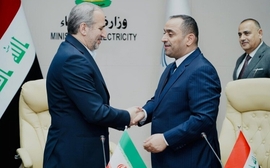As cutting-edge technologies are all the rage these days, the Caspian region’s Kazakhstan is anxious to move towards digitizing its infrastructure and economy, through enhanced ties with the United States.
To start, Silicon Valley in California will welcome Kazakhstani IT specialists for a six-month internship program. The participants were selected earlier this month by the country’s Shakhmardan Yessenov Science and Education Foundation, and representatives of American start-ups, including POWr, which designs website plug-ins; business-to-consumer (B2C) apps like 11Sight; texting apps such as Vimchat; and Live Event Assistant, or LEA. Kazakhstani interns will be working with these companies and trained by their respective teams.
“This is the second year we are participating in the Yessenov Foundation program and were extremely impressed by the quality of the candidates – we would hire them all if we could,” said Brian Canty, the founder of Lea, according to a release posted to the Yessenov foundation’s website.
“Several candidates had the exact engineering skills that we were looking for, and all had great personalities that would be a great fit for any startup,” he added.
Astana has been actively promoting science and technology in what is also Central Asia’s largest country and economy. It first launched the program in 2016, when five candidates were selected to study in California. This year the young IT specialists will work for the U.S.-based start-ups part of the time and remotely from Kazakhstan, and also during their stay in California.
The Shakhmardan Yessenov Science and Education Foundation helps specialists find start-ups in Silicon Valley for an internship, based on an official agreement. Each of the selected participants then joins a start-up for a period of no more than six months. All costs – including accommodation, visa fees, and airline tickets – are covered by the foundation.
This year 43 people applied to the program in which only five were selected.
“It is important for us that they return to Kazakhstan, applying their skills at home and [at the same time] continuing cooperation with the Americans,” Ilzira Aldagarova, a program manager at the Yessenov Foundation, told Sputnik.
With a gross domestic product of over $128 billion, Kazakhstan is Central Asia’s leading market and the third largest in the Caspian region, after Russia and Iran. As it aims to diversify an economy heavily reliant on hydrocarbon exports, the country is making a concerted push to develop its IT sector, looking to partner with U.S.-based companies to make it happen.
Last year, top officials from Astana agreed with the U.S.-based GVA Capital, a venture capital firm, to launch a representative office for Kazakhstan in Silicon Valley. The office is expected to create a platform that will help develop Kazakhstani start-ups in California, as well as strengthen country’s business and science sectors based on American know-how. At the same time, GVA Capital is funding an international program dubbed “Startup Kazakhstan,” aimed at developing both Kazakhstani startups and attracting foreign companies to the Caspian country.
In addition and since 2015, the Silicon Valley Innovation Center has been organizing start-up camps for Kazakhstani students. It has launched a training and mentoring program executive members, counselors and faculty at Nazarbayev Intellectual Schools, a network of schools in Kazakhstan for exceptional students between the ages of five through 18.
Official efforts spearheaded by Kazakhstan’s government include the strategic plan titled “Innovation-Industrial Development Strategy” which covered 2003-2015. The broad strategy focuses on Kazakhstan’s economic development and market diversification, whereby the country actively participates in global innovation initiatives, and moving from natural resource extraction to processing.
“Digital Kazakhstan” is another strategic project, spanning a four-year period and aimed at providing reliable, high-speed and secure digital infrastructure throughout the country. Objectives include training specialists, and improving the country’s economy through the widespread implementation of digital technologies, including in governance.
Later this year the Science Park Astana Business Campus at Nazarbayev University is expected to open, in which 90 global companies will participate in projects, including General Electric, Microsoft, Intel, Hewlett Packard, Samsung and Huawei. The government backed the project with the expectation that it will become Central Asia’s version of Silicon Valley, bringing together enterprises, students, innovators, inventors, scientists and venture capital funds.






 The number of evacuees from flooded areas in Kazakhstan has reached 97,852 people, including about 32,856 children since March 27.
The number of evacuees from flooded areas in Kazakhstan has reached 97,852 people, including about 32,856 children since March 27.
 The Islamic holy month of fasting, Ramadan comes to an end this week with the celebration of a joyous festival called Eid (meaning “festival” in Ar...
The Islamic holy month of fasting, Ramadan comes to an end this week with the celebration of a joyous festival called Eid (meaning “festival” in Ar...
 Iranian President Ebrahim Raisi warned Israel that it would face a "real and extensive" response if it makes any "mistake" following Tehran’s missi...
Iranian President Ebrahim Raisi warned Israel that it would face a "real and extensive" response if it makes any "mistake" following Tehran’s missi...



